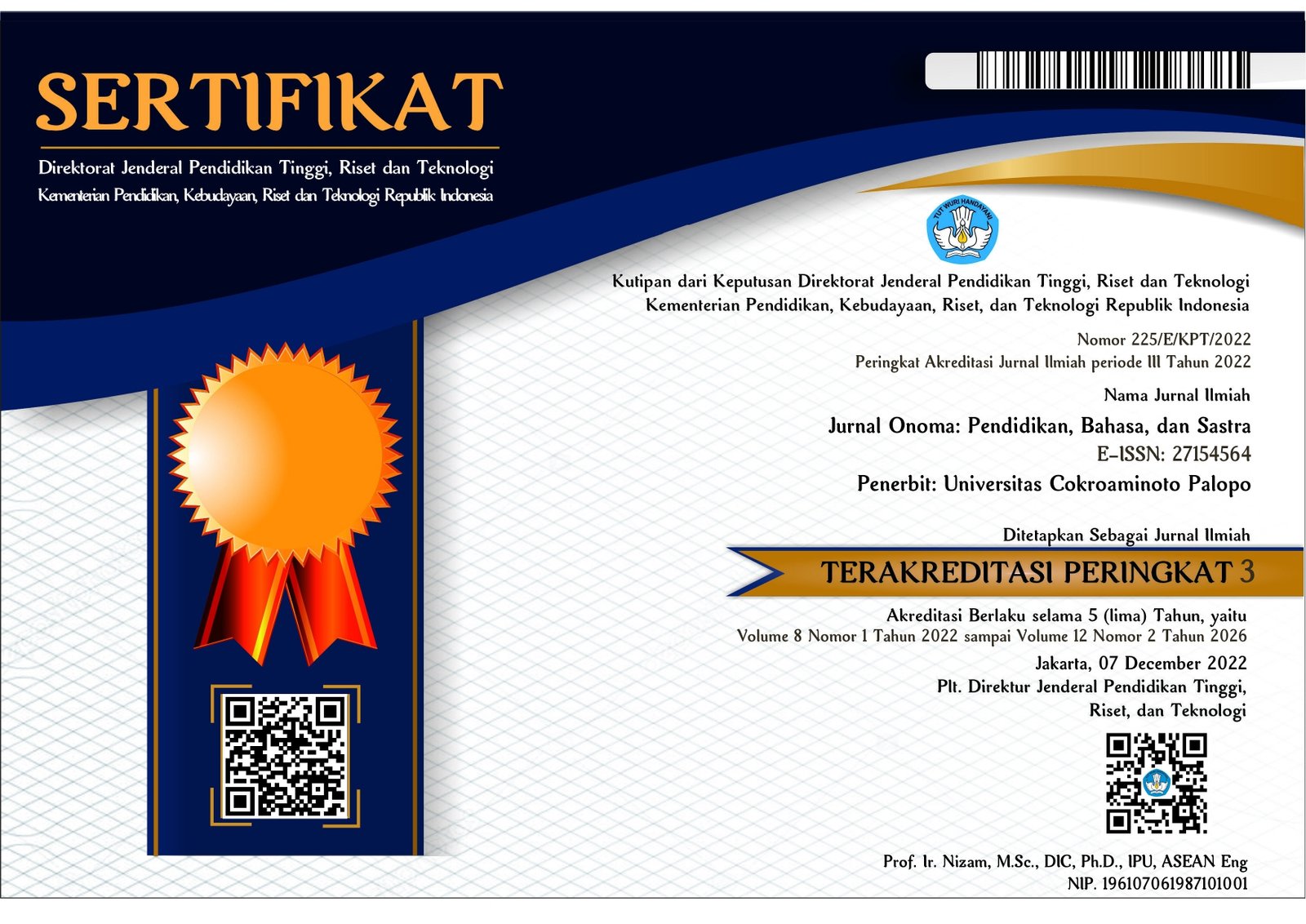Perubahan Bunyi Bahasa pada Proses Peluluhan Tata Bahasa Indonesia: Kajian Fonologi
https://doi.org/10.30605/onoma.v10i2.3670
Keywords:
bunyi bahasa, peluluhan, artikulatorAbstract
Bahasa sebagai sebuah fenomena menjadi sebuah hal yang selalu menarik untuk dikaji, pada tataran paling awal bahasa saja, yaitu bunyi bahasa, terdapat sejumlah fenomena mulai dari pembentukan bunyi bahasa hingga perubahan-perubahan yang terjadi. Analisis ini penting dilakukan karena untuk menyibak perubahan bunyi bahasa dengan menggunakan kajian fonologi. Penelitian ini bertujuan untuk mengetahui bagaimana proses pembentukan dan perubahan bunyi bahasa dalam kata yang mengalami proses peluluhan. Penelitian ini menggunakan metode kualitatif deskriptif. Dengan maksud untuk mengungkap proses pembentukan tiap kata luluh dari segi fonologisnya. Proses tersebut perlu dikaji karena sebagai proses penting dari pembentukan kata dalam bahasa Indonesia. Hasil dari penelitian ini menunjukkan bahwa dalam proses peluluhan bunyi [k,p,t,s] cenderung memilih bunyi yang daerah artikulasi atau alat artikulator yang sama.
Downloads
References
Amrulloh, M. A. (2017). Kesamaan Bunyi pada Sajak (Kajian Fonologi al-Qur’an dalam Surat al ‘Asar). Jurnal Al Bayan: Jurnal Jurusan Pendidikan Bahasa Arab, 9(1), 99–109. DOI: https://doi.org/10.24042/albayan.v9i1.1082
Badrih, M. (2021). Bahasa Indonesia Research: Kaidah, Strategi dan Teknik Menulis Karya Ilmiah.
Busri, H., & Badrih, M. (2015). Linguistik Indonesia: Pengantar Memahami Hakikat Bahasa (1st ed.). Penerbit Universitas Negeri Malang.
Chaer, A. (n.d.). Fonologi Bahasa Indonesia. Penerbit Rineka Cipta.
Latifah, U., Busri, H., & Badrih, M. (2023). Retorika estetik bahasa iklan online Ramadan 2022: Kajian Fungsional Aliran Praha. KEMBARA: Jurnal Keilmuan Bahasa, Sastra, Dan Pengajarannya, 9(1), 285–299. DOI: https://doi.org/10.30605/onoma.v9i2.2906
Masrukhi, M. (2002). Refleksi Fonologis Protobahasa Austronesia (PAN) Pada Bahasa Lubu. Humaniora, 14(1), 86–93.
Mukminin, A. (2021). Representasi kearifan lokal masyarakat Madura dalam bentuk Metafora pada lagu-lagu daerah Madura. Jurnal Ilmiah Sastra Dan Pembelajaranya, 10(1). DOI: https://doi.org/10.15294/jsi.v10i3.51953
Nusantari, A. P., & Rokhman, F. (2016). Kode Tutur Verbal Penutur Asingdalam Ranah Sosialmasyarakat Dwibahasawan. Seloka: Jurnal Pendidikan Bahasa Dan Sastra Indonesia, 5(1).
Rumilah, S., & Cahyani, I. (2020). Struktur bahasa; pembentukan kata dan morfem sebagai proses morfemis dan morfofonemik dalam bahasa Indonesia. Jurnal Pendidikan Bahasa Indonesia, 8(1), 70–87. DOI: https://doi.org/10.30659/j.8.1.70-87
Thalib, M. A. (2022). Pelatihan Analisis Data Model Miles Dan Huberman Untuk Riset Akuntansi Budaya. Madani: Jurnal Pengabdian Ilmiah, 5(1), 23–33. DOI: https://doi.org/10.30603/md.v5i1.2581
Triadi, R. B., & Emha, R. J. (2021). Fonologi Bahasa Indonesia.
Downloads
Published
How to Cite
License
In submitting the manuscript to the journal, the authors certify that:
- They are authorized by their co-authors to enter into these arrangements.
- The work described has not been formally published before, except in the form of an abstract or as part of a published lecture, review, thesis, or overlay journal.
- That it is not under consideration for publication elsewhere,
- That its publication has been approved by all the author(s) and by the responsible authorities – tacitly or explicitly – of the institutes where the work has been carried out.
- They secure the right to reproduce any material that has already been published or copyrighted elsewhere.
- They agree to the following license and copyright agreement.
License and Copyright Agreement
Authors who publish with Onoma Journal: Education, Languages??, and Literature agree to the following terms:
- Authors retain copyright and grant the journal right of first publication with the work simultaneously licensed under Creative Commons Attribution License (CC BY 4.0) that allows others to share the work with an acknowledgment of the work's authorship and initial publication in this journal.
- Authors are able to enter into separate, additional contractual arrangements for the non-exclusive distribution of the journal's published version of the work (e.g., post it to an institutional repository or publish it in a book), with an acknowledgment of its initial publication in this journal.
- Authors are permitted and encouraged to post their work online (e.g., in institutional repositories or on their website) prior to and during the submission process, as it can lead to productive exchanges, as well as earlier and greater citation of published work.

















